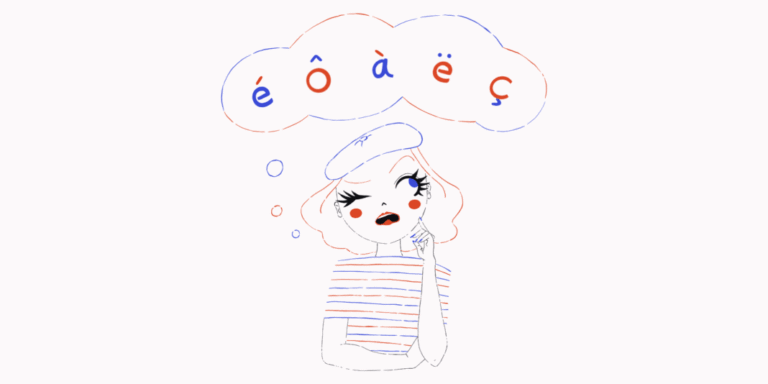If you said, “they’re French quotation marks”, then you probably speak French.
« , the symbol that stops any student of French in their tracks. I remember my first quotation mark query. I had been assigned a book, an easy one like Le Petit Nicolas. Mid-sentence, they emerged. « Alceste, tu es gros! » I whispered to myself, “What is this crap?” Was it an editor’s note to remove the phase? Was it a blip in the printer? Would the book change, and become written in the language of coding?
But no, those double pincers are the French version of quotation marks. And seeing them on the page surrounding an innocent quip of dialogue was only the beginning of my frustration with the French language, which has different grammar, syntax, and spacing, seemingly just to give my high school French teacher a reason to deduct points from my homework.
For those of you just beginning your journey into French punctuation, this will be helpful. For those of you with years of French grammar experience, I stand with you in frustrated solidarity.
1) The colon can do literally anything.
Colons take on the role of a semi-colon by combining two independent clauses that are related, or the role of em-dashes. They also need a space on each side. « I love you : do you love me? » Colons can introduce quotes, and not in the American way. Disgruntled, Michael said : « No, Cecilia, I won’t marry you. » It can also introduce lists, also not in the American way.
Americans say, « The party will have lots of games to play: horseshoe, BINGO, and hopscotch. »
French say, « Horseshoe, BINGO, and hopscotch: the party will have lots of games to play. »
Anything the colon wants to do, the colon gets to do. *cue dramatic montage music*
2) Quotation marks… ugh.
France doesn’t do “this” they do « this ». Their quotation marks are les guillemets. On an English language document, you type << this >>. If you want to look legit, change your document language to French, and “this” becomes « this ».
The real headache, though, is that there isn’t one type of quotation mark, there are two. And sometimes they are interchangeable. The « » indicates when a segment of dialogue is beginning and ending. It could be that someone is speaking, or a dialogue exchange between several people. The second indicator of a quotation is –. It’s an em-dash, or un tiret:
– It formats like this and indicates that someone began speaking, or a change in speaker during a dialogue. The tricky part is that France doesn’t tell you the speaker is. (Ha!) And an [enter] is what indicates when someone stops talking. Sometimes. Sometimes there’s no [enter] and the dialogue just moves on with another –. Frankly, it’s super impractical in a very long dialogue, because you have to remember who is speaking. Here’s an example of how guillemets and tirets work together in one confusing dialogue:
« Kevin, did you eat my pain au chocolat? Asked Julie. It was here on the counter.
–No, Molly, it wasn’t me.
–Yeah it was.
–No it wasn’t.
–Then who did?
–Mom’s home!
–Where was she?
–Grocery store?
–Maybe.
–Do you think she bought more pain au chocolat?
–I don’t know.
–I don’t know either.
–Whatever. »
I don’t even know who said what in that conversation, and I wrote it. Furthering the confusion, it’s also perfectly acceptable for a conversation to look like this:
« Kevin, don’t eat my pain au chocolat. –I won’t. –Are you sure? –Yes. –I’m worried. –Don’t. –Don’t what? –Don’t worry. –Oh. –Did you empty the dishwasher? –Why would I? –Mom asked you to. –No she didn’t. »
I also don’t know who said what in that conversation, and I also wrote that one. Both of these are equally acceptable sentences as well.
Un voix crie dans la nuit: —Oh mon cher!
Un voix crie dans la nuit: « Oh mon cher! »
Master Tip: Write down the first initial of the person speaking in front of the tiret.
3) What’s with the extra space before and after the « quotation marks » ?
Why does it need an extra space? «This» versus « this ». Regardless of where you put « » , the word inside them looks like it’s reverberating.
4) And extra space for other punctuation!
A lot of French punctuation suffers from claustrophia and needs extra, inexplicable space. There’s the colon : which we learned about. The semi-colon ; that’s le point-virgule. The exclamation point is le point d’exclamation ! And did you know the question mark is le point d’interrogation ? And all of those punctuation marks need spaces before and after them.
5) EVEN MORE EXTRA SPACE
There are extra spaces between paragraphs.
Which makes it seem like a jump in time.
But it’s not.
It’s just a new paragraph.
6) French-British rivalry results in death of Oxford Comma.
The comma is what the French call la virgule, and it’s their only comma. The French have complicated grammar, syntax and punctuation without the Oxford Comma.
7) The Ampersand: Not Just for M&M’s and PB&J’s
They spurn the Oxford Comma and yet embrace the ampersand! Une esperluette is the “&” sign, and it’s often used in place of an Oxford Comma. It’s not just used in informal French, you can use the ampersand in a business presentation. I feel mystified, confused & surprised at the French use of the ampersand.
8) Commas and periods have a role reversal.
The period is le point and I don’t see the point of switching it with the comma. Americans write 2,000,000. The French write 2.000.000 or they eliminate punctuation all together and write 2 000 000. The comma takes the period’s job of being a decimal point. An 80.4 on your exam becomes an 80,4. Neither comma nor period does any abbreviating. Instead of an American “min.” to abbreviate “minutes”, the French write “10 min”.
9) Ellipses mean two different things.
Speaking of periods, ellipses, des points de suspension, indicate both being cut off and trailing off. Those are very different things. Consider this situation: someone named Kevin is standing on a poorly built table.
“This feels like it’s going to break…”
“This feels like it’s going to break—”
One of those sentences ends with Kevin still standing, the other one ends with him flat on his butt on the floor and shards of broken table around him. Ellipses and em-dash make all the difference.
10) Short sentences are essential.
According to my personal experience—me, the writer of this article—your French professor (if they are from France) will tell you to have shorter sentences, because that’s how the French write scholastic papers, thus rendering things more readable, apparently.
They don’t want the sentence I just wrote. No introductory clauses. Minimal parentheticals and clauses. Shorter sentences result in many periods per paragraph. Periods abound.
Also additional spaces.





